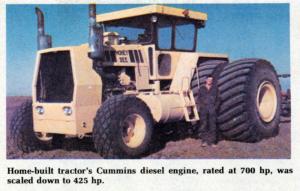1980 - Volume #4, Issue #1, Page #16
[ Sample Stories From This Issue | List of All Stories In This Issue | Print this story
| Read this issue]
Biggest Yet (425 hp) In Two Wheel Drive
 |
The result is one of the "biggest yet" in 2-wheel drive tractors. "We knew we could make it work if we could get big enough rear wheels for traction," says Greg Honey, who built it with his brother Glen.
Their giant tractor is powered by a Cummins V-12 diesel engine. "It was rated for 700 hp, which we scaled down to 425," Greg told FARM SHOW. "The advantage of the extra horsepower is that the engine develops extra torque and is easier on the clutch. With all this power we can start up at idling speed with the cultivator in the ground."
The tractor measures about 19 ft. long, 19 ft. wide and 12 ft. high. It easily pulls a 59 ft. wide field cultivator at 5 to 6 mph.
The Honeys found the large tires and rear end they needed for the 425 hp. "2-wheeler" in a used Clark dozer. Its rear tires measure 3 ft. wide and stand 8 ft. high. They are not weighted with a ballast and carry only 8 to 9 lbs. pressure.
The rest of the components of the tractor are a 13-speed transmission, home-built front axle with standard 23.1 by 26 in. front tires, two 135-gal. fuel tanks, and a modern cab.
All the parts are carried on a frame built of two steel plates 19 ft. long, 2 ft. wide, and 2 in. thick. Each plate weighs 3,200 lbs.
"We're especially proud of the cab which is big, dust-free and quiet," says Honey. "It's equipped with airconditioning, radio and tape deck, plus a monitoring system. A digital speedometer tells us how fast we are going, and an acre meter tells us how many acres we've planted and our rate of planting per hour."
It took about four months to build the big tractor which they call the "Honey Bee". All the work was done last winter in their farm shop, and the tractor was ready to roll for spring work. By the end of the 1979 cropping season, it had seeded and cultivated about 10,000 acres.
All the parts for the "Honey Bee" cost about $40,000, and the end product is a tractor that would cost $100,000 commercially, the Honeys point out. They might build another one this winter, but they aren't planning to get into commercial production.
For more details, contact: FARM SHOW Followup, Greg and Glenn Honey, Box 82, Bracken, Saskatchewan, Canada S0N 0G0 (ph 306 2932735).

Click here to download page story appeared in.

Click here to read entire issue
To read the rest of this story, download this issue below or click here to register with your account number.




